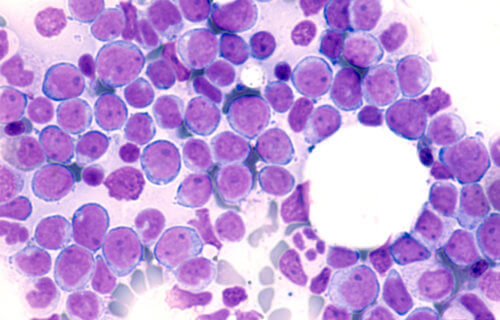CAMBRIDGE, United Kingdom — A new class of drug under development is showing promise as a possible cure for one of the deadliest and rarest blood cancers. Researchers from the University of Cambridge say it destroys a protein that fuels acute myeloid leukemia (AML).
Scientists are hopeful the technique used in creating this drug, STM2457, could lead to treatments for other forms of cancer.
In experiments on humans and mice, the new compound stopped the disease in its tracks. Researchers expect clinical trials to begin within the next year.
Specifically, the drug blocked the cancerous effect caused by over-expression of the enzyme METTL3. The medication inhibited its action in lab rodents with AML and tissue cultures from cancer patients.
“Proteins are essential for our bodies to function and are produced by a process that involves translating our DNA into RNA using enzymes,” study leader Professor Tony Kouzarides says in a university release.
“Sometimes, this process can go awry with potentially devastating consequences for human health. Until now, no one has targeted this essential process as a way of fighting cancer. This is the beginning of a new era for cancer therapeutics,” Prof. Kouzarides adds.
Targeting the enzymes that trigger blood cancer
Our genetic code is written in DNA. To generate proteins, molecules vital to the function of organisms, it first needs to change into RNA. Enzymes then make the chemical alterations. However, they can occasionally become unregulated, leading to an over-abundance.
Four years ago, Prof. Kouzarides and colleagues traced AML to the over-production of METTL3. It occurs when bone marrow makes abnormal white blood cells (or myeloid cells) which normally protect against infection and the spread of tissue damage. The mutated cells spread rapidly, usually requiring immediate treatment.
In tests on cell lines from individuals with AML, STM2457 significantly reduced their growth and proliferation. It also triggered apoptosis (or cell death), killing off the cancerous cells.
The AML cells from patients were then transplanted into immuno-compromised mice to model the disease. When researchers injected the animals with STM2457, it impaired the spread of the disease and dramatically prolonged their lifespans.
STM2457 also reduced the number of leukemia cells in the mouse bone marrow and spleen while showing no toxic side-effects.
“This is a brand-new field of research for cancer and the first drug-like molecule of its type to be developed,” says co-author Dr. Konstantinos Tzelepis. “Its success at killing leukemia cells and prolonging the lifespans of our mice is very promising and we hope to begin clinical trials to test successor molecules in patients as early as next year.”
“We also believe that this approach – of targeting these enzymes – could be used to treat a wide range of cancers, potentially offering us a new weapon in our arsenal against these terrible diseases,” Tzelepis continues.
Can ‘STORM’ stop one of the deadliest cancers on Earth?
Prof. Kouzarides and colleagues have set up start-up company, STORM Therapeutics. It specializes in translating research into the discovery of first-in-class drugs in oncology and other diseases.
“This work is yet another example of how our researchers strive to get new cancer treatments into the clinic and improve outcomes for cancer patients,” Michelle Mitchell, chief executive of Cancer Research UK concludes.
“Acute myeloid leukemia is an aggressive form of cancer which grows rapidly. Treatment is required as soon as possible after diagnosis, which means research like this can’t come soon enough. We look forward to seeing the outcomes of the phase 1 trial and the benefits it may have for AML sufferers and their families in the future.”
The American Cancer Society estimates there were about 60,000 new cases of leukemia in the United States in 2020. Less than 20,000 of those patients have AML. There were also approximately 23,100 deaths from leukemia however, over 11,000 of those were due to AML.
The findings appear in the journal Nature.
SWNS writer Mark Waghorn contributed to this report.
